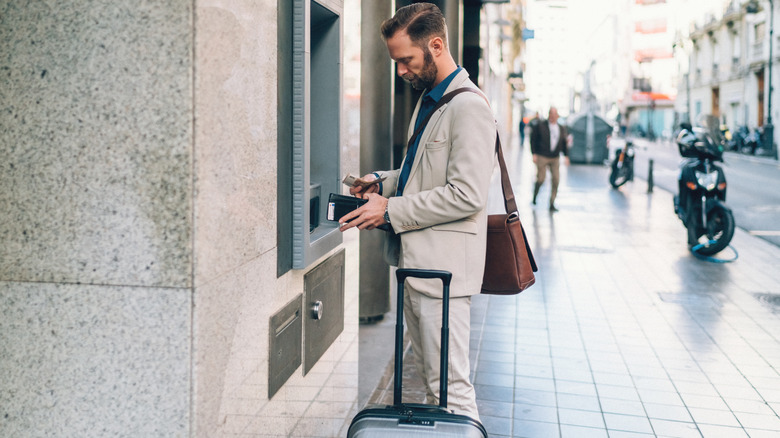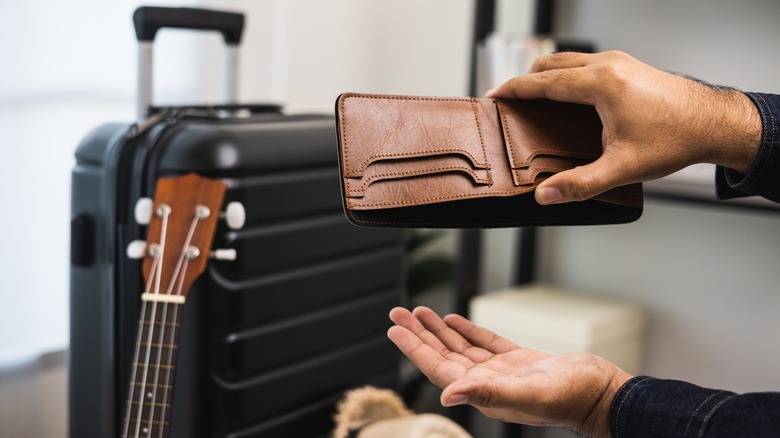Are Pay Later Travel Services The Key To Budget-Friendly Travel?
Even though traveling on a budget is the norm now, there's no denying that traveling is generally an expensive affair. Sure, you can save on hefty hotel room prices by booking hostels or couch surfing, and dodge exorbitant car rental fees and insurance by opting for public transportation, but your total expenses may still rack up to an amount that's way more than what you're willing to spring for.
With Forbes noting that an average 3-day domestic vacation typically costs roughly $1,400, you may be discouraged from even going on a trip, much less planning one. Alternatively, you may be drawn to trying out those travel now, pay later schemes that a slew of airlines have been peddling to fund your vacation and make payments more manageable. After all, many of the companies offering payment plans lure you in by not tacking on interest on your expenditures, be it airfare or hotel stays. The likes of Affirm, Klarna, Uplift, and Afterpay have tie-ups with airlines and travel companies to cover your expenses in advance.
Pay-later travel services help make traveling more accessible, but you have to be wary about using them should you decide to do so. Come to think of it, they're not so different from credit cards or loans.
How a travel now, pay later scheme can help you stretch your budget
If you've ever made a hefty purchase and split it into multiple payments, that's also essentially how pay-later travel schemes work. Companies like Uplift even take an extra step and perform a credit check to gauge your risk level as a borrower, but there are also some that only do a soft pull so as not to hurt your credit score. "The company's approval algorithm is able to understand consumer's ability to pay for large ticket items and approve them accordingly," Tom Botts, Uplift's CCO, told NBC News.
Aside from softening the blow of paying for travel, what's great about these services is their transparency. Before you even proceed with the purchase, you're already presented with a schedule of repayments and the corresponding amounts. You're also informed ahead of whether or not a certain purchase has associated interest fees. Approvals also have a fairly quick turnaround, with most services giving greenlighting purchases in seconds. "Offering payment flexibility to passengers not only facilitates the pent-up demand for travel but also emphasizes the need for personalized offers that cater to customers' payment preferences," Digitrips CEO Emilie Dumont told Travel Daily.
According to the Consumer Financial Protection Bureau, a whopping $800 million was spent on travel-related expenditures through pay-later services in 2021 alone, and that number has likely skyrocketed since. While there's no denying the convenience these programs bring, you need to be wary about the pitfalls, too.
But you have to approach it with caution
If you think pay-later travel services are too good to be true, it's because they kind of are. Should you wish to use them in the future to fund your trips, it's best to exercise caution because you may end up paying for trips that may not even happen. "If a trip is canceled or delayed with unexpected fees, your loan is still due. You're on the hook for the agreed-upon total," Priya Malani, the CEO and founder of Stash Wealth, shared with CNBC. "Even though you may have checked out in one fluid process, you're still working with two separate entities — the travel provider and the POS loan provider."
What's more, since you're paying very little upfront, you may end up forgetting that you actually owe a lot more and find yourself booking more trips than you can afford. The last thing you want is to accumulate debt as you failed to monitor the payment agreements you've previously obliged to follow through. Of course, this won't happen if you're careful and can make the necessary payments.
If you want to distance yourself from the risks of travel now, pay later schemes, you can always fund your vacations the old school way: by saving. Look into opening savings accounts with high-yield interests or automate funneling money to a separate travel fund. This way, you can travel now and pay now, with no financial headaches to consider later.


